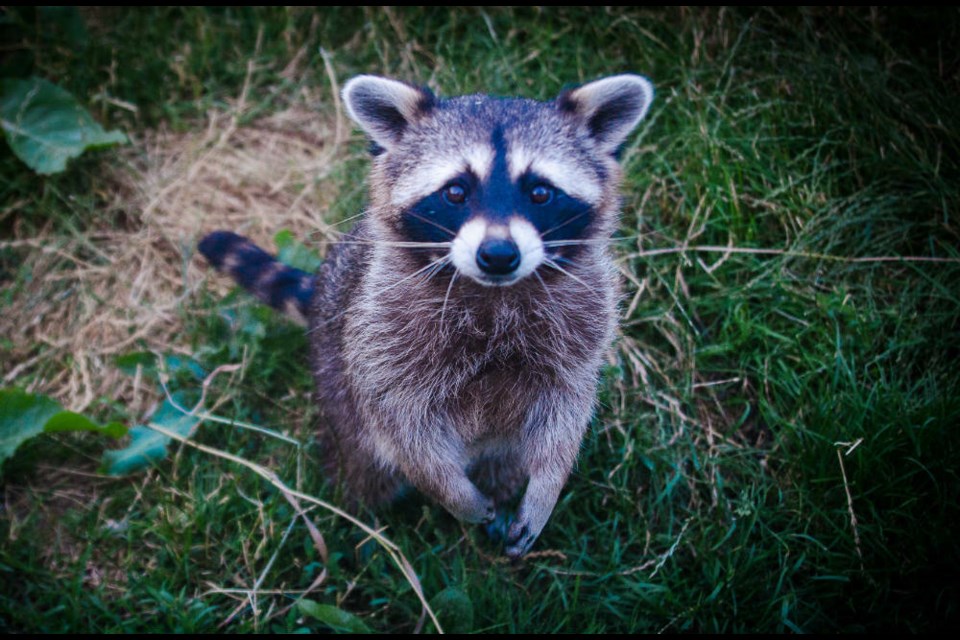A North Vancouver woman who spent hours trying to find help for a poisoned raccoon while the animal writhed in pain says people need to be more careful when using and disposing of toxic chemicals that wildlife can get into, including rat poison.
Jean McCreesh said she was out walking in Lynn Valley on the evening of Easter Sunday when she saw a raccoon in obvious distress.
The raccoon, which McCreesh said she spotted near the Mountain Village apartment buildings and Kirkstone Park, was staggering, falling down and appeared to have visual problems, said McCreesh. “It was trying to hold itself up,” she said.
McCreesh enlisted the help of her building manager Jim Thompson, but the animal was in such distress it wasn't possible to get close, she said.
Eventually the raccoon rolled down some grass and under a truck, where it continued to writhe in pain, said McCreesh.
As a former nurse, McCreesh said she recognized the signs of probable poisoning with a neurotoxin.
McCreesh said she was also concerned the raccoon could potentially have contracted avian flu. Eight skunks recently brought to a a wildlife centre in Metro Vancouver showing signs of possible poisoning were later determined to have the disease.
McCreesh said she warned neighbours to keep their pets away and began phoning any agency she could think of that might be able to help. But few vets or animal organizations were answering the phone over the long weekend, said McCreesh, and those that did didn’t deal with wildlife.
“I was so upset,” she said. “I was crying and praying.”
SPCA emergency helpers
Eventually McCreesh called the Vancouver SPCA’s after-hours emergency line, which provides emergency help for animals and wildlife throughout Metro Vancouver and the Fraser Valley.
A staffer drove out and managed to get the sick raccoon into a cage and drove it out to Critter Care in Langley, where McCreesh said staff later confirmed to her the animal was showing likely signs of poisoning. Unfortunately, by the time the animal arrived at the centre “it was too far gone” and had to be euthanized, said McCreesh.
McCreesh said the distressing experience is a needed reminder about the dangers of using chemicals like rat poison or leaving other toxic chemicals like antifreeze where animals might get into them.
People put “all manner of crap into the garbage cans,” and leave the lids open, as well as leaving jugs of coolant near recycle bins out in the open, said McCreesh. “People just don’t think.”
“Somebody may have put poison out” for rats which the raccoon got into, she added. “All we can do is educate the public about what they shouldn’t be doing.”
Some types of rat poison banned
In the past year, the province has restricted the sale and use of some types of rat poison that more commonly travel up the food chain and harm wildlife and pets.
Second generation anticoagulant rodenticides, also known as SGARs, were previously commonly used in residential bait traps. But predators that eat rodents that consumed poison are also at risk of lethal poisoning.
The provincial government banned those poisons in 2021, except in limited circumstances, following a campaign by North Vancouver activist Yasmin Abidi who helped rescue a young barred owl dubbed “Lucky” from poisoning in Heywood Park in 2020.
But other rat poisons, like warfarin, are still legal.
McCreesh said her recent experience with the raccoon shows there’s still work to be done when it comes to protecting wildlife from unintended consequences.
McCreesh added it was also hard to find out who to call after spotting an animal in distress.
Nicole McBain, manager of the BC SPCA’s night emergency program, said their organization does respond to emergency calls about wildlife or pets in distress after hours until about midnight. The public can phone for help at 604-879-7343.
McBain cautioned, however that staffing for the service – funded by donations from the public – is limited and covers a wide area.
Critter Care in Langley is the best place for sick or injured animals in the Metro Vancouver area, said McBain, while the Wildlife Rescue Association in Burnaby deals with sick and injured birds.




